olivia
Goodreads expatriate seeking a new online book community. I'm currently testing BookLikes to see if it could be home.
National Readathon Day
It has been a long time since I have posted here, but I have pledged to participate in the first National Readathon Day. I plan to read The Sense of an Ending by Julian Barnes.
Review: Turn Coat
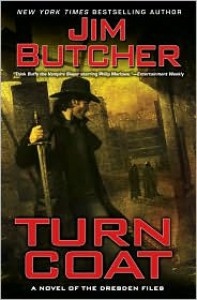
Warning: contains major spoilers for Small Favor and Turn Coat.
I was disappointed in Turn Coat after Small Favor, which, in my opinion, was one of the best books in the Dresden Files series. There were a number of things in this book that didn't make sense. Why didn't the skinwalker speak to Dresden in their first encounter? Why didn't Harry ask Listens-to-Wind about skinwalkers when he had the opportunity to do so in Edinburgh? (Indeed, Listens-to-Wind's response might've been useful in eliminating him as a Black Council suspect.)
Also, there's next to nothing about Michael Carpenter, which is astonishing and very unrealistic given what happened in Small Favor. One of Harry's greatest allies who nearly died in the last book is mentioned exactly once, indicating that he's crippled. No mention of Harry going to visit him to see how he's doing? No discussion of where Amoracchius is going? Heck, no suggestion about his potential for recovery?
Additionally, the twist about LaFortier's killer at the end doesn't stand up to any sort of scrutiny. If both of them were to be framed, then why have the money only sent to Morgan's account?
To me, the Black Council reveal also felt a little cheap, like Butcher had painted himself into a corner about who it couldn't be, so it ended up being someone we had no emotional investment in whatsoever and, indeed, had only encountered within this novel. As such, the person kind of sticks out.
While I was reading this one, I had the sense that Butcher wasn't as engaged or committed to writing it as he has been for many of the Dresden books, and I think I can speculate as to why: I looked back at the endcaps for the previous Dresden titles, and this is the first book that includes an Author's Note about his Codex Alera series. Obviously, if he's splitting his time between putting the wheels in motion to get that published and generating ideas about that world, he's not going to be quite as focused on Harry, which is understandable, but it was noticeable.
I've pretty much been reading this series based on the recommendations of three people, and since I'm this far into it, I suppose I'll complete it up to the current publication, but I am concerned about the quality of the Dresden books from here on out, since Butcher's attention is now divided between two series. Usually when that happens, the older product receives less of its creator's energy. We'll see.
Towers of Midnight
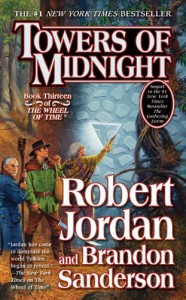
Caution: This review contains minor spoilers.
I have the impression that Brandon Sanderson, who has done an outstanding job with the Herculean task of finishing Robert Jordan's epic, The Wheel of Time, is tremendously fond of Perrin Aybara. I have this impression because there's an awful lot of Perrin in this book. I didn't count the chapters, but trust me: if you like Perrin, you'll like Towers of Midnight.
I don't dislike Perrin, but at this point in the story, there are several plot threads with rather interesting content, and I find most of those more engaging than his story. There's one in particular that I was dying to know about, and after 700 pages of mostly Perrin, I was getting extremely impatient. I won't post it here because it's too spoilery.
That's my primary complaint about Towers of Midnight, and it's why I'm giving the book four stars instead of five. I actually prefer the way Sanderson writes many of the characters, and if it had had more of any other character to balance the Perrin scales, I'd give it a higher rating.
On the plus side, Aviendha gets one of my two favorite scenes in the book; Mat gets the other. Again, I'll say no more, because they're both major spoilers.
PS: I still detest Tuon. I despise the way she treats Mat.
Is anyone else having difficulty assigning a rating?
I've just finished reading two books. When I click the book's image and then click Read in the window, it's not letting me assign a rating. Barnes & Noble is my current search provider, although I had the same problem with Powell's as my search provider.
Is anyone else unable to assign a rating through this window?
Many thanks!
Recommended BookLikes improvements
Right now, my #1 request for the developers would be to add the ability to view the stream on my Dashboard page as headers. The equivalent of an LJ-cut tag would be nice (for those who don't use LiveJournal, this is a special tag that enables you to hide all or part of your entry behind a link. It's especially handy for longer posts or reviews that contain spoilers).
A close second is my desire for built-in comment functionality: to me, conversation is a primary component of a social site. I'd prefer not to have to install it myself, and I'd prefer not to use Disqus. The following excerpt from Wikipedia clarifies why:
Some commentators have noted the privacy issues inherent in the use of services like Disqus, which serve their content through third party JavaScript widgets.[12][13][14]
As with other embedded web widgets such as like buttons, the Disqus widget acts as a web bug which tracks a users activities, even when they are not logged in, across different sites that use the Disqus commenting system. Information tracked by Disqus.com, which may be disclosed to 3rd parties, includes pseudonymous analytics data such as a users IP address, their web-browser's version and installed add-ons, and their referring pages and exit links.[15] Although this data is referred to by Disqus as "Non-Personally Identifiable Information", such data, when aggregated, has been shown to be usable for de-anonymizing users.[13]
Users wishing to avoid these issues may opt to install a privacy-enhancing web browser extension, such as Ghostery or DoNotTrackPlus, which identify widgets such as Disqus as web-bugs,[16][17] and allows them to be blocked; this renders Disqus-powered commenting sections unviewable.
Disqus has also been criticized for publishing its registered users' entire commenting histories, along with a list of connected blogs and services, on the publicly viewable user profile pages.[18]
 2
2
Terminal Freeze
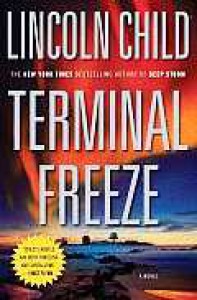
It's remarkable how much the quality of individual work can vary from that of collaborative efforts, sometimes for the better, and sometimes for the worse. I have read solo efforts by both Douglas Preston and Lincoln Child, and I think they are much better as a team. I found Terminal Freeze disappointingly predictable, to the point that I almost felt that I could've written the outline. I think it's okay for a writer to have a standard formula, but the formula alone doesn't bring a story to life, and this one feels phoned in.
All prolific writers have some works that are better than others, and this was one of the meh ones, in my opinion. (I don't want to write a review that includes spoilers, but let's just say that I couldn't help giggling and thinking of Lady Gaga's "Poker Face" every time a certain sound was heard by the expedition team. I know that sound was supposed to be menacing, but, well, not so much.) :)
I generally enjoy Lincoln Child's work, and I'll probably give another of his solo titles a chance, but in the spectrum of the books I've read by him, this may be the defining point for the low end.
― Elizabeth von Arnim, Elizabeth and Her German Garden
Blood Rites (The Dresden Files, Book 6)

I was exceedingly disappointed with the changes to the Dresden / Murphy dynamic in this one. I won't say more because I don't want to spoil anything, but I expected better after the high quality of Death Masks.
Extraction

Note: This review contains minor spoilers.
I feel bad saying that I didn't like this one, because normally I love a Pendergast tale, but I found Extraction quite disappointing. For one thing, it's very short; the total page count is inflated by the preview for Two Graves. I don't feel it was worth 99 cents of my time.
It bothered me that the story isn't internally consistent. Agent Pendergast tells Constance of an incident that occurred when he was nine years old. His six-year-old brother, Diogenes, overheard the household staff talking about the Tooth Fairy, a local man named Maurus Dufour who lived in a decrepit house nearby. The elderly recluse's reputation frightened the children of the French Quarter into offering the tribute of teeth they'd lost by depositing them in a receptacle on his front porch by the time of the full moon. Should a child fail to deliver the tooth by that time, the local lore claimed that Dufour would come and extract a tooth to claim his due.
The young Pendergast scoffs at Diogenes for believing such nonsense, however, as the story progresses, we find that Dufour must indeed be "appeased," as one character puts it. It's implied that this traumatic event is part of what altered Diogenes' path in later life, though we don't get any real details on that.
I'm sorry, but this just doesn't stand up to any sort of scrutiny whatsoever. Aloysius obviously never paid his due in teeth and wasn't harmed. If children of the French Quarter were being attacked in such a fashion as to cause the origin of the tale, isn't it reasonable to think that the New Orleans police would do something about it? And the vague hand-wave of an ending in which we never see Uncle Everett again seems both improbable and lazy.
When Preston and Child are at the top of their game, they are among the best in their genre, but this just isn't up to their usual quality. Frankly, it feels like their publisher might have pressed them to come up with a bone to throw their fans while we await the next novel ... if this had been a freebie offered on their web site, I might feel a little differently. I wouldn't think it was good work, but I'd shrug, think it was a nice little bit of filler for them to post on their site, and move on.
I look forward to Two Graves, as I know these authors can do better than this seemingly dashed-off effort.
Deadlocked (Sookie Stackhouse, Book 12)

Note: This review contains spoilers.
Deadlocked was a little better than the last book, but now I'm really afraid we're going to get a dull "There's no place like home" ending for Sookie Stackhouse, and that's disappointing. Dorothy Gale she ain't.
At least it actually ended at a reasonable stopping point. With the previous book, it was like Charlaine Harris just left her desk to go get a drink of water, and the publisher snatched it and released it while she was away. :)
I came late to this series and read 1 - 7 pretty much back to back, so I'm not tired of it the way some readers seem to be. I actually enjoy the local color and details of Sookie's life that Harris includes in the book. For me, it provides a nice reminder that she's still standing with one foot in her normal routine in the midst of all her supernatural adventures.
That being said, I saw the villain plot a mile away. I didn't mind that so much - every now and then, it's enjoyable to know you're on target and that you've figured things out, but there were things in the character dynamic that didn't feel right, and I was very disappointed with the author's decision to build the cluviel dor up so much, and then use it in that fashion. To have a device that powerful, perhaps the most powerful object we've seen in the series, and not expend it in a way that directly relates to the conclusion/resolution of the primary conflict and the relationship that readers are most interested in (Sookie/Eric) ... well, it seems a very odd plotting decision, and rather a waste of time for these two books. I'm not saying that Sam wasn't worth saving: of course he was. But Eric was right there. With superhuman speed and healing blood. He could've beaten Sookie to the body by a mile. It didn't really make any sense. It's like Harris gave herself a clear way to get herself out of a writing corner, and now she's written herself back into it. I hope I'm wrong, and that this is a misdirection that will lead to a happy surprise in the last book.
I did enjoy the descriptions of the fae at Hooligan's; Bellenos reminds me of Shakespeare's Puck just a tiny bit. I always find Niall fascinating: will it ultimately mean anything that our protagonist is related to the most alien of the supernaturals in the books? I don't think Sookie will ever get to see Faery at this point, which is something of a disappointment to me. Speaking of Sookie's heritage, I hope we'll see Mr. Cataliades once more so he can answer a few more questions and teach Sookie a bit more about her powers, but we are running out of time.
I'd imagine that Eric would've seen Freyda's type before during his long unlife and that she wouldn't hold very much appeal. Eh, another vampire queen. He's got plenty of money of his own, and do we really see Eric playing second fiddle to her for the rest of his days? Punishment from Felipe is more of a concern, in my opinion, and if Harris decides to be predictable, she could make that union a directive from Felipe.
Speaking of Freyda, I found that scene with her somewhat pointless, other than to let readers know what she was like. The only real upside was that we got to see Bubba again, and he and Sookie had a nice moment together.
If Sookie ends up married and pregnant by the character she saved at the end of Deadlocked, I will vomit. I will probably check Dead Ever After out from the library when it is released, just because I'm feeling a bit of doubt about where things seem to be going and I don't want to purchase a book that I fear may disappoint me.
I'd like to see the series get a good ending, so I really hope Charlaine Harris surprises us somehow. I believe that she can, and I'm keeping my fingers crossed that she will.
A few questions that stood out for me upon finishing the book:
- It was so much easier back when we just assumed that the fae blood in Sookie's heritage manifested itself in different ways, such as the telepathy trait that she and Hunter share and Jason's unusual attractiveness. Now, Mr. Cataliades has thrown a wrench in that, given that he says he gave Sookie her gift of telepathy, and that Barry, the other telepath we met, is Cataliades' great-great-grandson. Where does that leave Hunter, then? How did he get it?
- Sookie did make out her will in this book. Would Charlaine Harris kill off her main character? In doing so, would Sookie be transformed or become more supernatural than she is now? Would Niall cross over one more time to save her by taking her into Faery? After all, there would still be a Sookie in the world, given how Tara and J.B. named little Sara Sookie.
- What's going to happen with that upstairs room that Dermot was constructing? Sure, it could've just been a bit of business to keep the character occupied in the books, but I have to wonder if it will have some purpose. Dermot could've left a gift behind for Sookie (it was her birthday, after all), or Hunter could have need to come and live with her, or it could serve some other purpose. It may just be forgotten about with the next book, but it sure seems like it got mentioned a fair amount for just being a room.
- I do think Amelia Broadway still has a part to play, quite possibly with a useful magic spell. :)
Map of Bones (Sigma Force, Book 2)
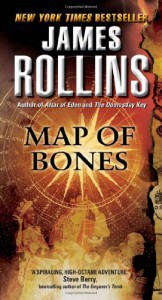
Map of Bones is the first book I've read by James Rollins. It was well-researched, and the ideas were entertaining.
That being said, I have a few tiny nitpicks with the book.
- Rollins appears to suffer from Cool Fictitious Character Name Syndrome, to the point that I was eyerolling a bit over some of them, which I felt crossed the line into cheese. Grayson "Gray" Pierce. Rachel Verona (for the female Italian character). Logan Gregory. Painter Crowe. Monsignor Vigor. Kathryn Bryant, who was nicknamed "Kat" possibly for the primary purpose of making a little joke later about "Kat toys." As I say, it's a minor issue, and not something that would prevent me from reading another book in the series, but I did find it smirkworthy.
- Again, it's a tiny thing, and bookmarks work just fine, but I found the structure of the book a little annoying. The chapters are exceedingly long. While they do include time demarcations within them, such as "1:34 pm," it can be hard to feel like one has reached a good stopping place, particularly in an action-packed title like this one.
- There are a few minor typos, grammatical errors, and odd word choices and phrasings. Some of these may be related to formatting the e-book (there are a few places where two words are crushed together without spaces, likethis, for example).
- In my opinion, the climax suffers just a touch from deus ex machina, which I found a bit unsatisfying and vague, given all the detailed information we'd been provided along the way.
- I found both of the romances very tacked-on and ham-handed ... one of them even implausible, given events that transpire in the second half of the book. There was no real need for it, and to me, it felt squeezed-in between the numerous confrontations. Really, it seemed like the author felt obligated to include it in the hope of an eventual Hollywood movie. This is perhaps my most legitimate annoyance with the book.
- I felt that the characters overexplained things frequently: there were numerous bits of dialogue where Monsignor Vigor broke down a puzzle for another character when the reader had figured it out four pages ago. I thought the exposition got a little heavy at times, but I suppose authors these days factor in readers having to put the book down at any given moment and want to make it easy for them to pick it back up without having to flip back to figure out what's going on.
Nitpicks aside, I found the premise of this book quite engaging, and while some plot points and characters are a bit over the top (such as the villain), I think that's okay for a romp in the adventure genre. The theories related to archaelogy, religion, mysticism and alchemy are what really caught me -- for me, that was the best part of the content.
I think Map of Bones is a good choice for a vacation read, if you're looking for something that's interesting without being too mentally heavy. I'd rank it above Dan Brown and perhaps just a hair below some of Preston & Child's better work in terms of overall quality.
Grave Peril (The Dresden Files, Book 3)

I'm three books into The Dresden Files, and I consider Grave Peril the best of the series so far. It establishes more of Harry's background, but manages to still keep things moving, and there's precious little of Murphy, which I count as a plus. Michael Carpenter is a fun addition, and a nice foil to our rumpled protagonist. This is the book that makes me want to read more of Jim Butcher's work.
Fool Moon (The Dresden Files, Book 2)

I enjoyed the first Dresden book much more than this one. To me, Fool Moon felt rather "checklisty," like Butcher was making sure we saw every single category of werewolf Bob had mentioned in his discussion with Harry early in the novel. The whole book felt disjointed, in my opinion, but I can't share the prime example without spoiling the climactic scene.
Before I started the Dresden series, I was warned by several friends that the first four titles are a bit weak, and then the books improve significantly, so I'll assume this was one of the rough patches and keep going.
The Hunger Games

I was somewhat hesitant about giving this book a try. It was recommended to me by several acquaintances, co-workers, friends and family members, and two of the enthusiasts were people whose reading tastes often differ significantly from my own. Nevertheless, three of the five are quite dependable kindred spirits on the literary front, so I decided to dive in. After all, one of the other reliable sources let me borrow it via Nook for free, so I had nothing to lose except time. :)
I mention that because I can now see why this book appeals to such a wide cross-section of readers. I don't think I've turned pages like this since Preston and Child's Relic -- Collins' characters are in constant danger; death could come from anywhere. There's nothing leisurely about The Hunger Games: it's tense and suspenseful enough to keep most readers engaged long past their bedtimes.
I was a bit surprised to learn that it's already being taught in schools. I'd be interested in seeing a study guide, because I don't feel there are a lot of layers and nuances in the narrative that are likely to be missed: I don't think I'd glean much more from a second or third reading: most of it is right there on the surface. I'm not saying that's a bad thing--I did enjoy the book--but I think many adult readers will get the "blossoms cut down in their prime/where have all the flowers gone" message of characters being named after flowers (Katniss, Primrose, Rue, even Buttercup; Katniss "blooms" in the woods). Some will catch that vox is Latin for voice, thus Avox could be interpreted as "sans voice," but you don't need to know that to realize they've been silenced. The references to Rome are billboard-sized, and anyone who's aware of the existence of reality television is likely to catch the television-as-colosseum metaphor. I could cite several other things, but my point is that it's very accessible. Readers who like to challenge themselves by analyzing themes and symbols won't need to invest a great deal of time in close scrutiny, because what's there is fairly obvious. The Hunger Games is not particularly subtle. :)
Despite its lack of understatement, I found The Hunger Games to be an interesting and compelling tale of surviving a system where the haves control and oppress the have-nots, and I look forward to seeing a few mysteries explained in the second and third books in the trilogy. I've already started Catching Fire.
Blue
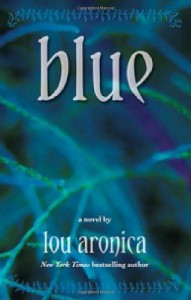
Pros: Realistic portrayal of a post-divorce dynamic; fairly accurate (if somewhat glossed-over) depiction of cancer treatment; excellent descriptions of the world of Tamarisk.
Cons: Disappointing (for me) ending; for me, the author's frequent references to real-world personalities and content often knocked me out of the narrative and broke the fourth wall.Although it isn't specifically labeled as such, as several other reviewers have said, this seems like young adult fiction. I found the story reasonably engaging, but the swift resolution and the ending's message didn't sit well with me. I'll avoid spoilers, but there's a detail in the last few pages that changed my perspective on Tamarisk in a way that soured me a bit on the book.Also, I disagreed with the writer's decision to mention Britney Spears, Johnny Depp, and other details that firmly set the time frame of this narrative. I think authors who choose to do this run a strong risk of dating their book prematurely.
Blue isn't a bad book, but it isn't a great one. Hindsight being what it is, I would've preferred to invest the same time in reading a title with a more satisfying resolution. It's unlikely that I'd recommend it.
Storm Front (The Dresden Files, Book 1)
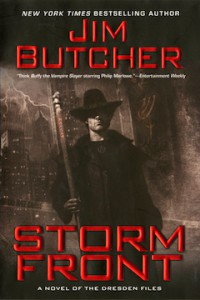
I'd been advised by several friends to "give this series time." From disparate peer groups that do not interact, I'd heard "it gets better."
If that's so, I'm looking forward to the next Dresden book all the more. Because, honestly, I thought this one was quite entertaining.
It's true that the villain is obvious fairly early on. The naming of the NeverNever sounds a bit childish to me, and the whole soulgazing thing seems a bit awkward to me. Murphy seems somewhat thinly drawn at this point. However, these are likely just tiny smudges on a gem that will become more polished with each successive novel in the series.
These books have a lot of personality, and I appreciated the way Butcher sketched out the details of Harry's world. He could've left out a lot of atmospheric details, assuming that most readers have some sense of what Chicago looks like, but I'm glad he didn't: his language makes it Harry's Chicago, and cocoons readers in the wonderful, gauzy rain of a genre that's new to me: magical noir.
I appreciate the sense of humor and warmth that pervaded Storm Front, and I look forward to getting to know Harry, Murphy, Bob, the White Council, and Dresden's Chicago even better as I progress through the series.




